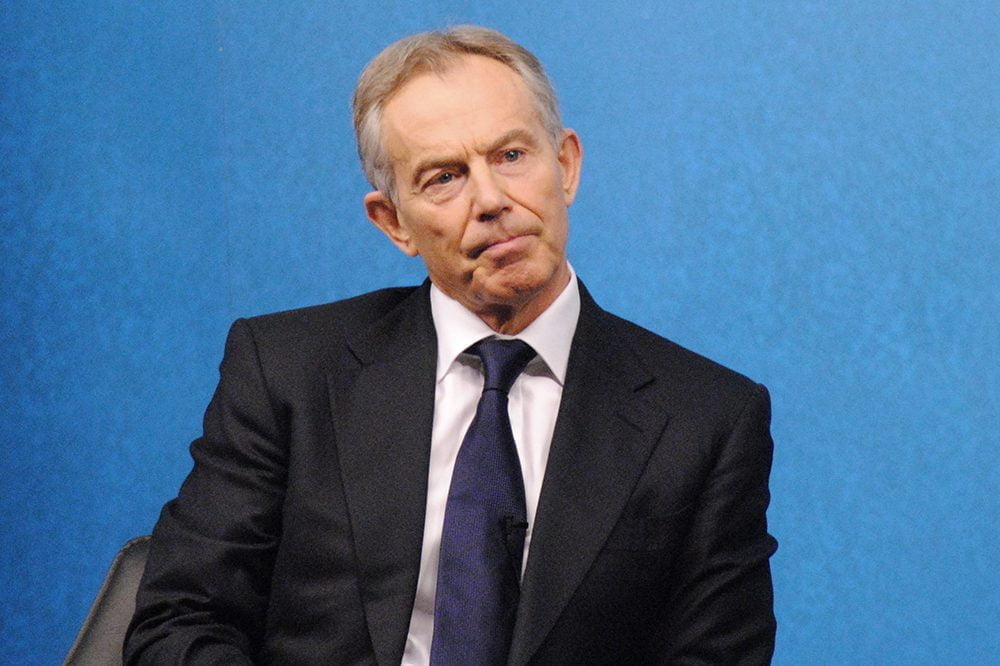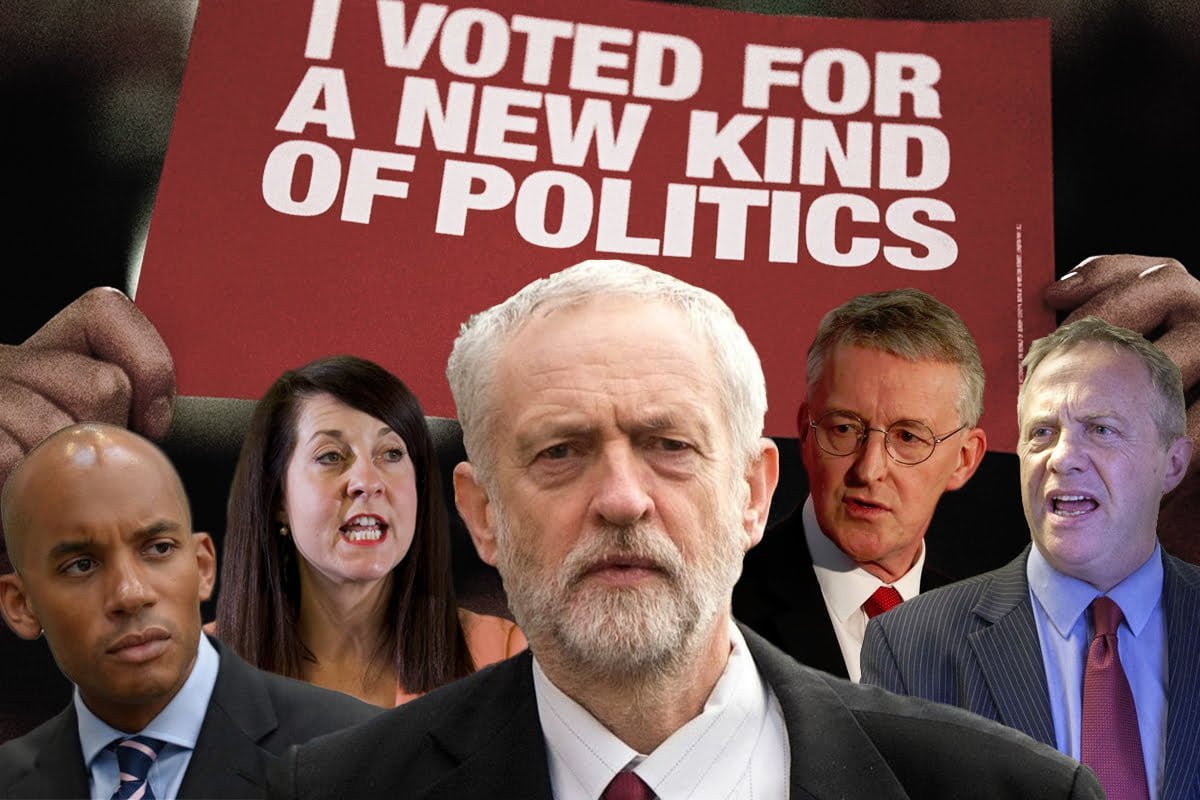Another week, another terrible headline for Corbyn in the Guardian, this time courtesy of their friends in the Fabian Society. But the shock announcement that “Labour could slump to below 150 MPs” is just a thin veneer to mask the Labour right wing’s desire to see the party fail and provide an excuse for another coup against Corbyn.
Another week, another terrible headline for Corbyn in the Guardian, this time courtesy of their friends in the Fabian Society. Announcing the findings of a highly superficial and subjective report from the anti-Corbyn faction as if they weren’t biased, the Guardian website’s main headline shouted “Labour Could Slump to Below 150 MPs, Fabian Society Warns”. Anyone actually reading the article, however, quickly discovers this claim to be so superficial as to be meaningless.
The report has been deliberately engineered to produce these “findings”, in order to be used as a weapon against the left in Labour. The reasoning is just a thin veneer, failing to mask the right wing’s desire to see Labour lose in such a manner under Corbyn.
Unprecedented times
There only seem to be about two arguments in this report to support its pessimistic conclusion. The main one consists of empty guesswork from contrived statistics. Digging through years of opinion polls and election results, the Fabians have found that, typically, the Party gets 8 percentage points fewer votes in general elections than in the opinion polls that preceded it, where these opinion polls were taken two years after the previous general election. Today’s opinion polls are close to two years after the election, so the conclusion is that Labour will most likely get about 20% of the vote (having 28% in most polls now), which would probably lead to it winning only 150 seats.
Notwithstanding the obvious folly of basing any analysis entirely on highly discredited opinion polling, let alone opinion polls years before an election, such an approach is extremely dubious for many reasons. Long-term averages might be good predictors, but only of future averages, not of individual results, since that is what they reflect – the aggregate of what may be widely divergent individual results. Thus the average wealth of a millionaire and a beggar is at least £500,000, but this in no way implies the typical person possesses that amount.
The report contains no attempt to analyse what is specific about the current political situation, which is indeed very specific – hence Corbyn’s two leadership election victories. We are in a period of unprecedented turbulence; this is widely recognised. We are in a period in which the tectonic plates of politics are shifting as never before, something the right wing of Labour are utterly unattuned to and failed to see. Isolating one average across highly different decades and planting it in today’s context as if today were the most typical of all periods is worse than useless.
Where did the working class go?
 The other argument in the report is based on the finding that apparently only just over half of Labour’s 2015 voters say they now support the party. This statistic certainly has more weight than the previous one, but it is extremely one-sided. We also know that from 1997 to 2015, Labour lost approximately 5m voters, predominantly from the working class. After the 2015 election, Jon Trickett MP produced some analysis that showed its 2015 vote was the most middle-class in Labour’s history; huge sections of the working class having abandoned it, mostly to vote for no one.
The other argument in the report is based on the finding that apparently only just over half of Labour’s 2015 voters say they now support the party. This statistic certainly has more weight than the previous one, but it is extremely one-sided. We also know that from 1997 to 2015, Labour lost approximately 5m voters, predominantly from the working class. After the 2015 election, Jon Trickett MP produced some analysis that showed its 2015 vote was the most middle-class in Labour’s history; huge sections of the working class having abandoned it, mostly to vote for no one.
A more pertinent question would therefore be: how many ex-Labour working class voters now support, or are likely to support Labour? Better still: under whose leadership, and which policies, will they most likely to be won to Labour – Corbyn’s (reformist) socialism; or, say, Hilary Benn’s establishment liberalism/Blairism?
The report then criticises Labour under Corbyn as ‘muffled’ and ‘confused’ regarding Brexit, but fails to identify the obvious culprit for this: the Blairites who the morning after the Brexit vote and the resignation of the Tory Prime Minister, set about dragging the party into an unwanted leadership election and period of intense division. Such MPs continue to hold the party back by refusing to campaign for Corbyn’s policies, instead briefing against him and producing negative reports such as this one!
These same MPs, meanwhile, themselves create the utmost confusion regarding Brexit by constantly pandering to the UKIP and the right-wing media and calling for Labour to adopt a more anti-immigration stance. Do these respectable ladies and gentlemen really think that Labour will stop any hemorrhaging of voters to UKIP by aping their reactionary programme? The fact is that only a class-based programme that offers a socialist alternative on the question of jobs and housing can cut across the xenophobia of UKIP and win over workers and the poor in Brexit-supporting areas.
Insofar as potential Labour voters are not prepared to vote Labour right now, surely the biggest reason is that the Party looks utterly divided and a complete mass thanks to the antics of the Blairite gangsters in the PLP. If Corbyn can barely form a shadow cabinet, how will he manage to form a government charged with transforming society and challenging the rich? The most pressing task for the Left, therefore, is the democratisation of Labour, placing MPs under the control of the members.
The crisis of social democracy
The report concludes that this all means Labour must form ‘progressive’ electoral alliances with the likes of the Lib Dems. This, after all, is what these liberals within the Labour Party have always been after. They want a weakened Labour to be forced into coalition with parties to its right, so that they have a permanent excuse to carry out a liberal – rather than a socialist – programme.
Everywhere we look across the world, two general trends emerge: on the one hand, a political polarisation, with a collapse of the so-called “centre-ground” that the Blairites and liberals are so fond of; and, on the other hand, a crisis of social democracy, with reformists forced to carry out counter-reforms in this age of austerity. This – combined with the constant barrage of Blairite attacks against Corbyn – is the context within which one must see Labour’s low polling.
Of course it will be a challenge for Labour to win the next general election, especially if the Tories succeed in gerrymandering the constituency boundaries (not to mention the loss of Scotland to the SNP, itself the result of decades of complacency and arrogance from the right-wing Scottish Labour leadership). The Corbyn leadership may have its weaknesses. But does anyone really think that the best way to rise to this challenge is to revert to the discredited, establishment politics of Blairism and liberalism etc, or by forming a coalition with the hated and weak Lib Dems?
Throw caution to the wind
 Socialists have to base themselves on foresight, not blowing whichever way the mainstream media tell us the wind is blowing. What is in store for British capitalism over the next few years? Obviously the storms of Brexit will be intense and unpredictable, but without doubt they will in time discredit Theresa May and damage the already anaemic economy.
Socialists have to base themselves on foresight, not blowing whichever way the mainstream media tell us the wind is blowing. What is in store for British capitalism over the next few years? Obviously the storms of Brexit will be intense and unpredictable, but without doubt they will in time discredit Theresa May and damage the already anaemic economy.
Additionally, a new report tells us that Britain is experiencing an unsustainable credit boom, on a par with that preceding the 2008 crash. “Unsecured consumer credit, which includes credit cards, car loans and second mortgages, grew by 10.8% in the year to November to £192.2bn, picking up pace on the previous month to grow at its fastest rate in more than 11 years.” (The Guardian,4.1.17) The IMF has found that world debt as a proportion of GDP is at its highest ever – higher than in even 2008. Brexit and financial crisis will interact and inflict serious blows on British capitalism in the coming period – this at a time of already existing mass anger and polarisation.
The task is to foresee this, to prepare for it, with socialist policies that reflect this anger and give a clear answer to the endless and worsening crisis of capitalism. The key to Labour’s future success will be in how the Party responds to the enormous events that impend.
That requires political leadership based on socialist principles, not chasing after contrived focus group findings of the past and abstract opinion poll averages. Above all, the Labour Party can only win by throwing caution to the wind and fighting passionately for the interests of the working class.






